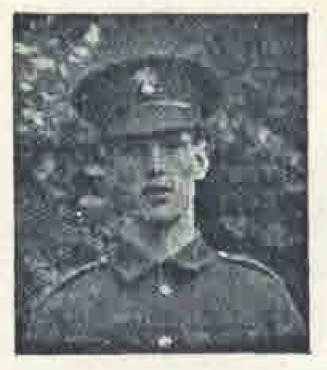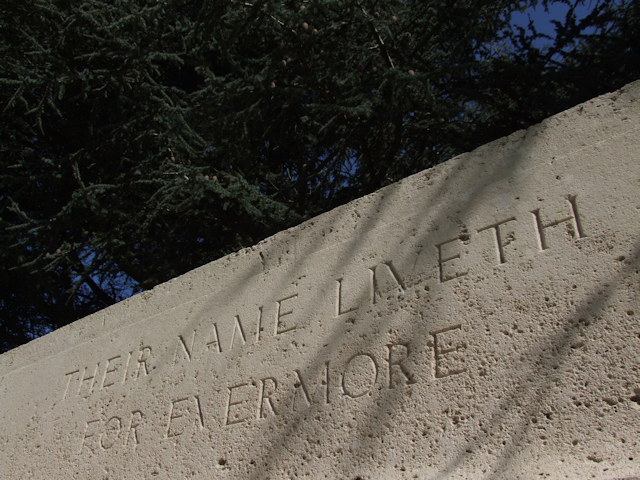Name
Christopher R Fowler
Conflict
First World War
Date of Death / Age
13/03/1915
22
Rank, Service Number & Service Details
Private
1465
Honourable Artillery Company
1st Bn.
Awards: Service Medals/Honour Awards
Not Yet Researched
Cemetery/Memorial: Name/Reference/Country
LOKER CHURCHYARD
II. C. 11.
Belgium
Headstone Inscription
Not Researched
UK & Other Memorials
St Edmunds College Memorial, Old Hall Green
Biography
The following text was transcribed from The Edmundian (1914-1919) – The contemporary magazine of St Edmund’s College:
The following begins with letters written before Christopher's death.
We regret to record that the writer of the following letters was severely wounded in action on the 12th March, and died on the. following day.
19th Dec., 1915.
We had a particularly rotten time on the last occasion in the trenches. Although we had only one casualty, we were told we were in for two days and night. It rained unceasingly waist deep in mud and water. We stuck it well for the two days and nights, and just as we were expecting relief we were told that we would have to stick it for another day and night. Oh, what a disappointment.
Whew, can you imagine it? It was almost like a death sentence. The morale of the troops is glorious. Only two men crocked up on the march home. That was simply splendid. Plenty now, though, have dropped out through Rheumatism, and it's a wonder that there is a man tit to move. I guess it was the worst time anyone could possibly have. Fortunately we were not shelled much. They couldn't shell us in some places; the trenches were about 15 yards away from each other, and woe betide anyone who so much as put his hair above the top of the trench. The greatest writer of the day cannot describe the wretchedness of the trenches. Sleep in two feet of water is of course out of the question. We exist for letters only. Chocolate, that is the call, chocolate.
Singularly enough there is not much smoking. Sometimes we raise a song, but for the most part we talk and think of home. Home, what would I give, what would I do, where would I go, for home. There are rumours about us going back for a rest, and I believe we shall very shortly. If we don't there will not be a man left. We have only 498 (unless there are some more casualties) out of 800 that left Anerly. We had a rough time there, but that was a four-post spring bed to this. Still we are happy, at least I am, but I wish it was all over. I shall appreciate you and home all the more, although I think I can appreciate anything now. Oh, for a bed and a fireside.
Obituary
Readers of the Edmundian will learns with special regret that this gallant young soldier whose letters have appeared in our latest numbers, met his death on February 18th as a result of the wounds he had received in action on the previous day. His graphic account of life in the trenches, of the various hardships of the soldier's lot, of the dangers that he modestly Brit so intrepidly faced, his references to the College and to the Edmundian seemed to keep hint in close touch with us.
By the kindness of his family his long letters home were constantly forwarded to us. Only extracts could appear in our pages, for much of what he wrote was sacred in its intimate reference to the home life for which he cared so intensely. Bat the writer of these lines who has been privileged to read the affectionate open-hearted messages in their entirety, can bear witness to the evidence they gave of his simple, straightforward, unassuming character, his deep love for his parents and family, his vivid interest in life and his genuine humble piety. In one of his last letters he said that he was looking forward to the Edmundian and that he thought of writing to the "old college." Sometimes he wrote as weary, and sometimes he allowed himself a characteristic British grumble, hut all through ran a note of .courageous cheeriness and quiet consciousness of duty to lie done without any fuss. So closed a career of solid, unpretending worth.
Christopher Richard Fowler was born on 28th February, 1893, being the son of Mr. and Mrs. A. Christopher Fowler of Ealing, so that he had just completed his twenty-second year. He entered St. Edmund's with the idea of studying for the priesthood in September 1905. He joined the third School of Rudiments. Whole at the College he was always keen on games, was a member of the choir as a treble, to the last Ire retained his love of music asset frequently spoke of it in his letters from the trenches and took a useful though not prominent part in the Christmas plays. Realizing at length that he was not called to the priesthood he left the. College at the end of 1908, and entered his father's business. He also joined the Honourable Artillery Company and -when the war broke out he was ordered with his regiment to the front. he went out in September and during the following two months was at the base employed in various arduous duties as described by hint in the letters printed in our last issue. In November the H.A.C. moved up into the firing line of which he wrote "I want the firing line experience before I get home." The letters published in this number carry the story down to the beginning of March. On Friday, March 12th, he was wounded in the head and on the following morning he passed away.
His commanding officer has since written to Mr. Fowler saying: “An attack was made upon the German position and our Company held a trench immediately in front. We were subject to very heavy liming from German machine guns and your son was unhappily hit in the head. He was unconscious from the first and cannot have even been aware that he was hit, so he suffered no pain at all. He survived his wound some hours. As he still lived as soon as it was dark he was taken away to the hospital, where he died, so I do not know whether he ever recovered consciousness, but I do not think he did. . . . He was so keen in all he did, so determined, so plucky and so willing, showing all those characteristics which endear a man at the front to his comrades and to his officers."
The deepest sympathy will be felt for his bereaved parents and family in their loss. Mass for the repose of his soul was celebrated in the College Chapel the morning after the news of his death was received.
Acknowledgments
Jonty Wild, Di Vanderson, The Edmundian (1814-1819) – The contemporary magazine of St Edmund’s College



